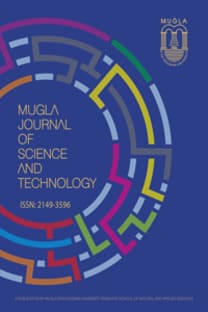KİTLESEL AÇIK ÇEVRİMİÇİ KURS (KAÇK)’LARIN GAIA YÖNTEMİ İLE MİMARİ TASARIMI
Kitlesel açık çevrimiçi kurs, Çok etmenli sistemler, Gaia metodolojisi
ARCHITECTURAL DESIGN OF MULTI-AGENT MASSIVE OPEN ONLINE COURSES (MOOCs) WITH GAIA METHODOLOGY
___
- Kop, R., Fournier, H., and Mak, J. S. F., “A pedagogy of abundance or a pedagogy to support human beings? Participant support on massive open online courses.”, The International Review Of Research In Open And Distributed Learning, Vol. 12, no. 7, pp. 74-93, 2011.
- Daradoumis, T., Bassi, R., Xhafa, F., and Caballé, S., “A review on massive e-learning (MOOC) design, delivery and assessment.”, In P2P, Parallel, Grid, Cloud and Internet Computing (3PGCIC), 2013 Eighth International Conference on, 2013, pp. 208-213.
- Zambonelli, F., Jennings, N.R. and Wooldridge, M., “Developing multiagent systems: The Gaia methodology”, ACM Transactions on Software Engineering and Methodologies, Vol. 12, no. 3, pp. 317-370, 2003.
- Bresciani, P., Perini, A., Giorgini, P., Giunchiglia, F. and Mylopoulos, J., “Tropos: An agent-oriented software development methodology”, Autonomous Agents and Multi-Agent Systems, Vol. 8 no. 3, pp. 203-236, 2004.
- Bernon, C., Gleizes, M-P., Peyruqueou, S. and Picard , G.,”ADELFE: A methodology for adaptive multi-agent systems engineering”, Lecture Notes in Artificial Intelligence, Vol. 2577, pp. 70-81, 2003.
- DeLoach, S.A., Wood, M.F. and Sparkman, C.H., “Multiagent systems engineering”, International Journal of Software Engineering and Knowledge Engineering, Vol. 11, no. 3, pp. 231-258, 2001.
- Padgham, L. and Winikoff, M., “Prometheus: A methodology for developing intelligent agents”, Lecture Notes in Computer Science, Vol. 2585, pp. 174-185, 2002.
- Pavon, J., Gomez, J. ve Fuentes, R., “The INGENIAS Methodology and Tools”, Agent-Oriented Methodologies, Idea Group Publishing, pp. 236-276, 2005.
- Iglesias, C.A., Garijo, M., Gonzalez, J.C., and Velasco, J.R., “Analysis and design of multi-agent systems using MAS-CommonKADS”, Lecture Notes in Artificial Intelligence, Vol. 1365, pp. 313-326, 1998.
- Cossentino M., “From Requirements to Code with the PASSI Methodology”, Agent-Oriented Methodologies, Idea Group Publishing, pp. 79-106, 2005.
- Zambonelli, F., Jennings, N.R. and Wooldridge, M., "Multi-Agent Systems as Computational Organizations: The Gaia Methodology", Agent-Oriented Methodologies, Idea Group Publishing, pp. 136-172, 2005.
- Tamersoy, M., Afsar, B., Erata, F., ve Kardas, G., “Gaia ile Çok-Etmenli Konferans Yönetim Sistemi Analiz ve Tasarımı” 4. Ulusal Yazılım Mühendisliği Sempozyumu (UYMS 2009), 2009, ss. 83-90.
- Zambonelli, F., Jennings, N.R. and Wooldridge, M., “Organisational rules as an abstraction for the analysis and design of multi-agent systems”, International Journal of Software Engineering and Knowledge Engineering, Vol. 11, no. 3, pp. 303-328, 2001.
- Wooldridge, M., Jennings, N. R. ve Kinny, D. “The Gaia methodology for agent-oriented analysis and design”, Journal of Autonomous Agents and Multi-Agent Systems, Vol. 3, no. 3, pp. 285-312, 2000.
- Simon, H. A., “Models of man: social and rational”, Wiley Publishing, New York, 287 p., 1957.
- Haggard, S., Brown, S., Mills, R., Tait, A., Warburton, S., Lawton, W., and Angulo, T., “The Maturing of the MOOC: literature review of massive open online courses and other forms of online distance learning.”, Department for Business, Innovation and Skills, UK Government, 2013.
- Siemens, G., “Massive open online courses: Innovation in education.”, Open educational resources: Innovation, research and practice, 5, 2013.
- ISSN: 2149-3596
- Yayın Aralığı: 2
- Başlangıç: 2015
- Yayıncı: Muğla Sıtkı Koçman Üniversitesi Fen Bilimleri Enstitüsü
ERGUN KAYA, EMEL YILMAZ GOKDOGAN
TABANI İZOLE MÜZE BİNALARINDA GÖRÜNTÜLENEN ESKİ HEYKELLERİN DİKEY SİSMİK İZOLASYONU
FOTOVOLTAİK ÜRETİM TEKNOLOJİLERİ ÜZERİNE BİR ARAŞTIRMA
MOLEKÜLER CIMBIZLAMAYA DAYALI YENİ BİR BISFENOL-BIPHENANTHROLINE SENTEZİ
Said Nadeem, Burhan Khan, Muhammad Shah, Mehmet Özler
KİTLESEL AÇIK ÇEVRİMİÇİ KURS (KAÇK)’LARIN GAIA YÖNTEMİ İLE MİMARİ TASARIMI
